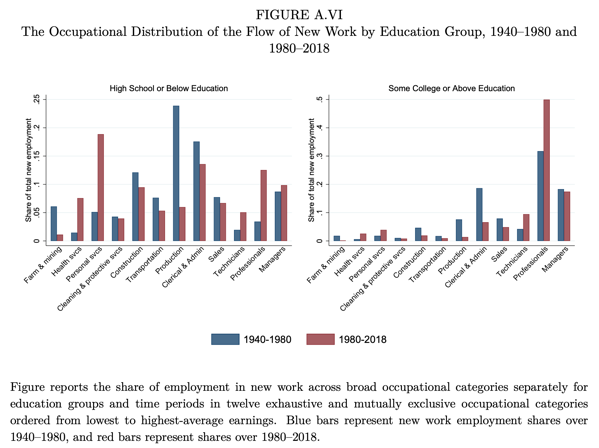
22 Jan Where are new tasks, work, and jobs emerging?
I ran across this working paper from Dr. David Autor, a labor economist at MIT:
Autor, D., Chin, C., Salomons, A., & Seegmiller, B. (2023). New frontiers: The origins and content of new work, 1940-2018. Quarterly Journal of Economics (forthcoming).
Autor et al. defined new work as “the introduction of new job tasks or job categories requiring specialized human expertise” (p. 1). In other words, in which occupational sectors are new tasks, work, and jobs emerging / declining, and for whom?
Here is an informative chart from page A13 of the Appendix (page 73 of the PDF):

[download a larger copy of this image]
As we can see, the growth of new work in the Farm and Mining sector has been low since 1980 regardless of workers’ level of education. In contrast, for workers with a high school education or less, we can see larger growth in new work since 1980 in sectors such as Health Services, Personal Services, and Technicians. Growth for workers with some college education or higher since 1980 is primarily concentrated in the highest-earning sectors of Professionals and Managers. Workers with a high school education or less have seen some growth of new work since 1980 in those higher-earning categories too, but the overall data are more mixed. For instance, look at the large decline since 1980 in the Production sector and the concurrent declines in other sectors such as Construction, Transportation, Sales, and Clerical and Administrative.
The decades-long sorting of the American workforce by education level continues, with implications for lifetime earnings. Something to consider as we think about preparing ‘college and career ready’ graduates for life success…
Your thoughts and reactions?
Related Posts
I ran across this working paper from Dr. David Autor, a labor economist at MIT: Autor, D., Chin, C., Salomons, A., & Seegmiller, B. (2023). New frontiers: The origins and content of new work, 1940-2018. Quarterly Journal of Economics (forthcoming). Autor et al. defined new work as “the introduction of new job tasks or job Workforce and Economy, workforceRead More
Workforce and Economy, workforceRead More

Sorry, the comment form is closed at this time.